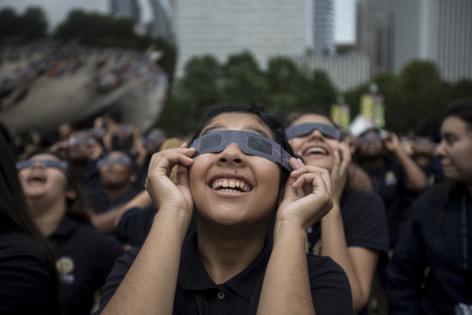Eclipse chasers head to southern Illinois for 2nd total solar eclipse in 7 years: 'You get hooked'
Published in Lifestyles
In 1999, Michelle Nichols saw her first total solar eclipse on a cruise in the Black Sea. It would be many years before she witnessed another one during a visit to southern Illinois in 2017.
“It seemed so far in the future,” she said.
Now, Nichols, an astronomer, educator and the director of public observing at the Adler Planetarium, is planning to return to Carbondale, Illinois, where the moon will completely block out the sun for more than four minutes on April 8. It is the second time in seven years that southern Illinois has been in the path of totality, or the moon’s shadow.
Rarely do these celestial bodies line up perfectly with the earth to create a total eclipse. It’s even rarer for a total eclipse to plunge the same region into darkness in less than a decade.
“Any given location on Earth will see an actual, total solar eclipse on average every 375 years,” Nichols said. “So you have to be at the right place, at the right time.”
While Chicago is not in the path of totality again this year, the area will experience a partial eclipse, and the sky will darken.
The contiguous United States won’t see another total eclipse until 2044, and that one will only brush Montana and North Dakota, according to NASA.
For centuries, humans have chased solar eclipses, fascinated by the skies above them. Today, social media has also contributed to the popularity of eclipse chasing, engaging tens of thousands of enthusiasts from all over the world who connect over advice, travel plans and shared experiences.
Studying the planets and stars is one thing; experiencing them up close and personal is another thing entirely. Nichols can still recount the moments leading up to a total eclipse in vivid, minute detail. As the moon gradually covers the sun, shadows grow sharper and temperatures drop.
“If you’re out where maybe you’re near a farmer’s field,” Nichols said, “you might notice the cows starting to walk to the barn. You might notice crickets chirping. You might notice birds coming to roost in trees because, for all they know, it’s nighttime.”
...continued
©2024 Chicago Tribune. Visit at chicagotribune.com. Distributed by Tribune Content Agency, LLC.







Comments